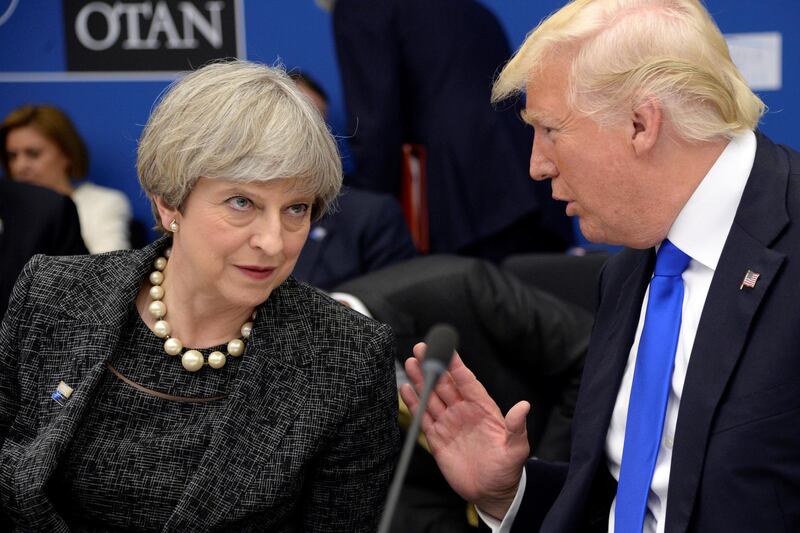Of all the issues he has to grapple with at home and abroad, US president president Donald Trump spent the late-night hours engaging in a personal spat over Twitter with British prime minister Theresa May, his opposite number in the trans-Atlantic so-called "special relationship."
After Britain condemned the president's retweeting of a video circulated by the British extremist fringe group Britain First, Mr Trump shot off an angry public - and personal - message to Mrs May. "Don't focus on me, focus on the destructive Radical Islamic Terrorism that is taking place within the United Kingdom," he tweeted.
The US leader was reacting to a statement from the British prime minister’s office hours before, which said Britain First sought to divide communities through its use of "hateful narratives which peddle lies and stoke tensions."
Travelling in Iraq, Saudi Arabia and Jordan, Mrs May was ill-placed to handle the fallout. She did not address the issue in a major Middle East-focused speech in Amman but gave an answer in a question session with the press later.
“I’m very clear that retweeting from Britain First was the wrong thing to do,” she said. The group’s views were against British values and common decency. Pointedly she added Britain fought terror from whatever source it emanated, including the far-Right.
Many leading members of Mrs May’s government expressed personal disgust. Communities Secretary Sajid Javid said Mr Trump had "endorsed the views of a vile, hate-filled racist organisation that hates me and people like me," adding: "He is wrong and I refuse to let it go and say nothing.
Alistair Burt, the veteran foreign office minister, also described the tweet as a setback for efforts against extremism. In his own tweet he wrote, "As Minister for the Middle East, proud of our relationships with the Islamic world and those within it, the White House tweets are both alarming and despairing tonight. This is so not where the world needs to go. ” .
Brendan Cox, the widower of Jo Cox, the member of parliament who was murdered last year, accused the president of enabling extremists. "Trump has legitimised the far-Right in his own country, now he’s trying to do it in ours. Spreading hatred has consequences and the president should be ashamed of himself," he said.
Sir Jeremy Greenstock, a former British ambassador to the United Nations, believes Mrs May had no choice but to speak out against promotion of hate-filled material from the far-Right. “Normally our differences with the US, and there are usually some, are conducted in private,” he said. “When it comes out in public like this any prime minister has to state clearly where he or she stands and say it out in the voice of the British people.”
Though the British prime minister was the first foreign leader invited to the Oval office after the US election, this incident has illustrated how Mrs May, who is formal and reserved by nature, has struggled with the advent of Mr Trump to the office of president.
The British diplomats at the country’s Washington embassy performed with silken grace in the aftermath of the inauguration, securing Mrs May a first meeting for a foreign leader in the Oval Office.
Arranging a return visit n for President Trump has been more tricky. Vaguely mooted for sometime in 2018, his tweets have only strengthened the numbers of those who do not want him to be invited at all.
Emily Thornberry, the shadow foreign secretary, said Mr Trump's tweets were designed to "humiliate and belittle" the prime minister and had put the Queen in a "very difficult and invidious position" as the host for the planned state visit.
In America, mainstream members of Mr Trump's own Republican party have rebuked him for his brusque handing of the British. “PM @theresa_may is one of the great world leaders, I have incredible love and respect for her and for the way she leads the United Kingdom, especially in the face of turbulence,” wrote veteran senator Orin Hatch.
While helpful, such reassurance does not resolve Britain’s dilemma. Mrs May has given every impression of a leader torn between conflicting impulses. With Britain facing a vengeful Europe after Brexit, London needs the US partnership more than at any time in decades. Yet British political reality means Mrs May must take a stance when the US president offends against the received sensibilities of mainstream opinion.
A slip on the ramp as she exited the Oval Office in January set the tone for the relationship. The pair were photographed holding hands. It would have been easy to portray the gesture as a symbol of personal friendship. Instead Mrs May called it “a moment of assistance” for a president who is reportedly unsteady on stairs.






